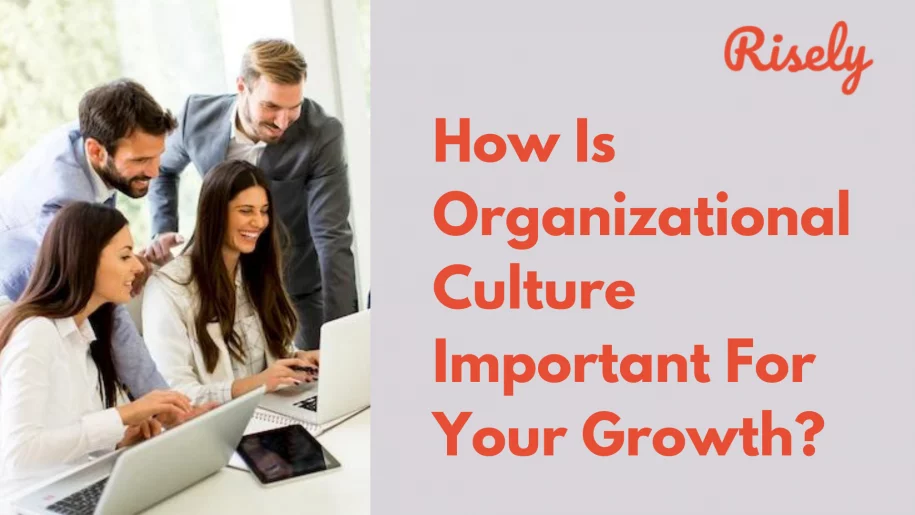How Is Organizational Culture Important For Your Growth?
Organizational culture is one of the most important aspects of a company, as it can significantly impact team performance. Not only does it define how employees behave, but it can also help to foster innovation and creativity. In addition, a team with a strong culture can weather tough times and attract and retain top talent. If you’re a manager or leader looking for ways to improve team performance, you need to build an organizational culture supporting growth. This blog will help you understand why culture is so important and outline the steps you need to take to create a culture that promotes success. Bon appétit!What is organizational culture?
Organizational culture is an organization’s shared values, norms, and beliefs. It can profoundly impact how employees behave, think, and feel. As a result, it can directly impact how people perform their jobs and the satisfaction they experience in those roles. In addition, organizational culture can increase efficiency and productivity when done correctly while promoting camaraderie among team members. However, bad cultures can lead to chaos and strife if it’s not well-developed or enforced. Many different factors contribute to the development of an effective organizational culture. Its Mission & Values Statements form the keystones for developing a culture, whereas the Leadership Style, Policies & Procedures affect the day-to-day working. Therefore, each component should be tailored specifically for your organization to achieve desired results. The organization’s culture is one of the most important aspects of a team’s growth. It’s the foundation on which employee productivity and loyalty are built. A healthy organizational culture encourages creativity and flexibility while discouraging negative attitudes and conflict. To create an optimal culture, it’s essential to understand your company’s history and values. By understanding how your team thinks, behaves, and feels about their work environment, you can create a culture that will help your company thrive and grow.Is Organizational Culture Important For Your Team?
Organizational culture is an essential factor in team growth and success. A positive culture supports productivity and innovation. It helps team members feel supported and appreciated, which leads to better work performance. Conversely, a dysfunctional or hostile organizational culture can impede team performance and recruitment efforts.Sets expectations and standards
Organizational culture can play a vital role in helping a team achieve its objectives. It establishes the expectations held by managers from employees, and it guides how to behave both individually and collectively. Several elements comprise organizational culture, including values, norms, behaviors, and assumptions about how people work. These elements become the guidelines for behaviors embraced by new team members too. A workplace culture that sets clear expectations and standards promotes teamwork. It reduces the likelihood of employees feeling overwhelmed by their work. Clear, concise goals help team members stay on track and make informed decisions. When team members understand their roles, they’re better equipped to contribute value to the organization. Managers can often find individual members differentiating on their ideals in the absence of a set of values followed by the whole team.Employees are satisfied at work
A positive organizational culture satisfies employees. Team members feel valued and respected, which creates a sense of satisfaction. In addition, a good culture conveys that employee contributions are essential to company success, making them inspired. Team members are more likely to give their best effort when they feel appreciated. This retention of talent helps your team thrive in the long run.Fewer conflicts, more collaboration
A positive culture in the organization is conducive to healthy team dynamics. Conflicts are a natural part of teamwork, but when they arise, teams should resolve them in a constructive manner. A strong culture values collaboration and communication over confrontation. This approach leads to better problem-solving skills and increased trust among team members. When conflicts arise, it’s easier for everyone to understand what happened and move forward. A high-performance organization relies on the contributions of its employees. Good cultural habits help teams achieve this goal by instilling pride in workmanship and motivation.OtherInterestingReads
How Is Organizational Culture Important For Managers?
Organizational culture is an essential factor in employee growth and development. It can impact the way you think, work, and behave. Good organizational cultures are supportive, allow for creativity and experimentation, and emphasize feedback and continuous learning. If you’re looking for a challenging but rewarding job, consider applying to an organization with a good culture.Stress-free environment
A healthy organizational culture is beneficial to employee health. A stress-free environment allows you to concentrate on work and enjoy doing something you are passionate about. When you are relaxed and content, you can produce high-quality results. By building an excellent organizational culture, you can combat many potential sources of stress before they begin to plague your teams, such as indecisiveness and problematic behavior. It will also help you establish an actionable workflow practically followed by your team. As a result, you can focus on core tasks and delegate effectively to your team members.Productive teams
A solid organizational culture fosters productive teams. Productivity measures how much output your team has produced in a given period. When employees are housed and work together in harmonious, supportive conditions, they are more likely to be productive. Research has shown that almost half of all job performance can be attributed to team productivity. A good organizational culture facilitates positive interactions and collaboration among team members. It also encourages individuals to share their knowledge and best practices with colleagues. It leads to the development of expertise and the transfer of learning within the organization- critical factors for increased productivity. In totality, the team you lead becomes more productive by achieving its goals effectively.Attract and retain talent
A healthy organizational culture is also crucial for retaining talent. When employees feel valued and respected, they are more likely to remain with your organization. In addition, a good organizational culture fosters trust and communication between team members. Open dialogue allows everyone in the company to quickly understand each other’s goals and objectives- a key factor for employee satisfaction. As such, you establish an organizational culture that benefits employee productivity and retention. Moreover, a good organizational culture contributes to building a good reputation for your team, based on which you can attract more talent.Leave your impression on the team
A good culture also leaves a lasting impression on the team. When employees feel appreciated and supported, they are more likely to be creative and innovative in their work. They will likewise take pride in their work and community engagement. In other words, a healthy organizational culture allows you to create an environment where your team members are inspired to achieve great things- both individually and collectively. In addition, it leads to increased employee productivity and loyalty within the organization- two crucial ingredients for success. In sum, creating a good organizational culture is crucial for achieving success as a leader. It enables the managers to position themselves as an effective leader who understands and supports the growth of teams.What happens if the organizational culture is weak?
Employees will not feel valued and respected if the organizational culture is weak. They will also lack trust in their team members, and communication might be difficult. As a result, productivity and retention may suffer. Moreover, an organization with a bad culture can experience negative employee reviews, which could lead to loss of business or recruitment difficulties. In short, poor organizational culture jeopardizes everything from employee satisfaction to team performance. Moreover, the impact falls on you as well. When a manager deals with a team working in a poor organizational culture, they find themselves in chaos. As a result, their productivity and performance suffer due to stress. Additionally, their competency as a manager could be questioned, making them feel like an imposter at work. New managers building teams from scratch or joining underdeveloped groups might find themselves experiencing imposter syndrome at work as a consequence. If you find yourself doing a lot of firefighting in your team, then leadership coaching could be the right route for you. Join Risely today to access autonomous learning that brings your team together. It offers customized roadmaps to overcome people management challenges you are facing, solvable at your pace.How to build a culture that supports your growth?
Organizational culture is an important factor in employee growth and success. By understanding what it is and how it affects employees, you can create an environment that supports their development.- Start by understanding what organizational culture is. It’s basically the culture of an organization as a whole, and it affects everything from employee motivation to team productivity.
- Next, create a vision for your team. Establish clear goals and expectations for employees. Make sure everyone knows what’s expected of them, and holds them accountable to these standards.
- Additionally, create a workplace that is stress-free and conducive to creativity. It will help encourage innovation and creativity among employees and cultivate a sense of belonging.
- Last but not least, focus on creating a positive team identity. You can achieve it by focusing on shared values and principles and creating an environment where people feel appreciated.
- Visit our step-by-step guide for managers to improve the organizational culture.
Conclusion
Organizational culture is a key factor in employee satisfaction and productivity. It is essential for a healthy work environment and can have a positive impact on team morale. In order to build an organizational culture that supports your growth, it is important to understand the different aspects of organizational culture and how they impact you. Furthermore, it is important to create mechanisms encouraging team collaboration and creativity. By following these tips, you can create a culture that supports your growth and allows you to achieve your goals. Keep visiting us to learn more about management and leadership.Confused about the importance of organizational culture for you?
Download our free growth mindset toolkit to learn why and how organizational culture impacts teams.
Other Related Blogs
5 Steps to Time Management Training for Managers
5 Steps to Time Management Training for Managers In today’s fast-paced and demanding world, time management has become more critical than ever. Whether you are a professional striving for success…
Prioritize ZZZs: Tackling Sleep Deprivation for Peak Performance
Prioritize ZZZs: Tackling Sleep Deprivation for Peak Performance Is work keeping you up too late? The number might surprise you, but about 38% of American professionals experience fatigue at work…
You Only Need To Improve By 1% Today
You Only Need To Improve By 1% Today Let’s start today’s edition with a reflecting question. Which one of these statements do you resonate the most with? 1. “I’m all…
Top Time Management Coaches: Take Control Of Your Time Today
Top Time Management Coaches: Take Control Of Your Time Today In the fast-paced world of modern business, effective time management is not just a valuable skill—it’s a necessity for success.…


